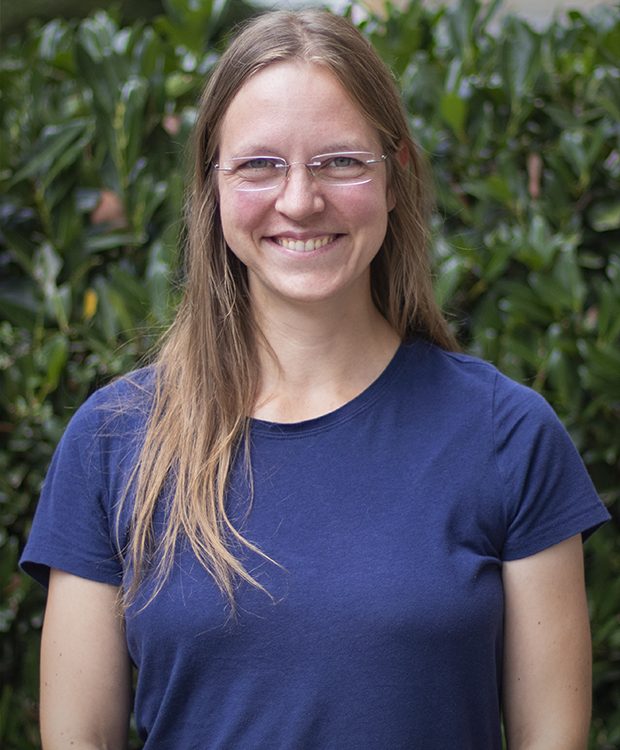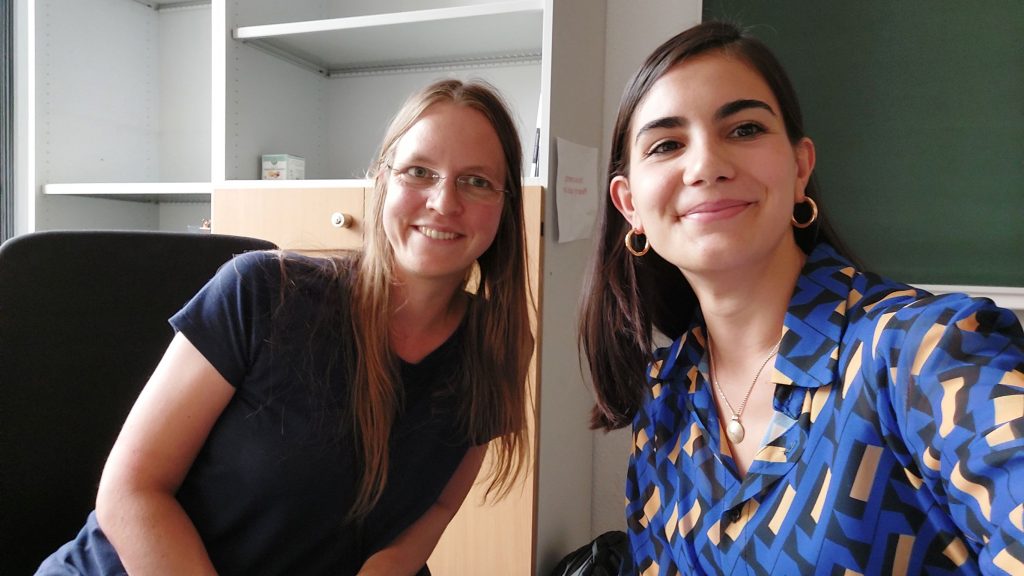
A conversation with Lisa Sauermann
Interview by Raffaella Mulas*
- Born inGermany
- Studied inGermany
- Lives inUnited States
Interview
*This interview has appeared on the MaddMaths website on September 10, 2022. Picture courtesy of Max Planck Insitute for Mathematics in the Sciences.
Lisa Sauermann is an Assistant Professor in the Mathematics Department at the Massachusetts Institute of Technology (MIT). She was born in 1992 in Dresden, Germany. She studied at the University of Bonn and she completed her PhD at Stanford University, before becoming Assistant Professor at MIT at the age of 28. Lisa is best known for her results in extremal and probabilistic combinatorics, as well as for her achievements at the International Mathematical Olympiad, where she won four gold medals and one silver medal, and where in 2011 she was the only participant who reached a perfect score.
In August 2022, Lisa visited the Max Planck Institute for Mathematics in the Sciences. She presented a recent work in which, together with other collaborators, she proved an old conjecture of Erdős and McKay, for which Paul Erdős offered $100. During this occasion, Raffaella Mulas took the chance to ask questions about herself and her career.
Thank you for taking the time to meet me, Lisa! I would like to start from the beginning, by asking you how you discovered your passion for mathematics, and in particular how old you were.
It was a gradual process, but it started when I was maybe ten or so. My parents knew that I liked riddles and puzzles, and one day my mother showed me the problems of some local math competitions for kids. I really enjoyed tackling the problems, so I decided to take part in these competitions. This is how I started to be exposed to the mathematics that they don’t teach you in school, and I discovered that there was a kind of mathematics where you don’t have to do computations with numbers. How was it for you?
It’s funny because I can give the exact same answer you gave, with the only difference being that in my case it was my father who showed me the problems of the local math competitions. In fact, it might have been the same year as when it happened for you, since we are the same age. And what was it about these competitions that interested you the most?
I liked the math problems, but I also really enjoyed the social aspect very much. It was nice to take part in the competitions and to meet other kids who had my same interests. And at some point, maybe when I was around 12, I started to travel to other cities and stay overnight, without my parents, to take part in national competitions. I had a lot of fun. I got to know many interesting people and new friends, and I got more and more fascinated by the social component of these events.
Interesting, so it seems that the social aspect had a big impact on your choice of becoming a mathematician.
Yes, it definitely had a very big impact.
How did your perception of mathematics change after you started to do “real math” at university?
It changed completely! When you take part in competitions, you have four hours for solving a set of problems, and you know that the solution must be relatively short. Research is completely different, because you could think about a problem for months, or even years.
And what is one thing that didn’t change?
One thing that didn’t change? This is a good question. Let me think about it… Maybe, the fun I have! This didn’t change.
Well, this is a good answer! Now, your mathematical work is mainly in the area of combinatorics; how did you end up working on this topic?
Typically, people who take part in math competitions end up taking many combinatorics courses and working directly on this area, because it is usually the focus of such competitions. But I think it’s good to explore different areas of mathematics, and when I did my undergrad in Bonn I didn’t do any combinatorics. In fact, I focused on algebraic geometry, and I wrote my bachelor thesis in 2014 with Michael Rapoport. It was only when I was in Stanford for my PhD program that I changed my mind and I started to focus on combinatorics instead. This happened after following Jacob Fox’s course on extremal combinatorics. I first took this course just for fun, but then I liked the class so much that I decided to work on these topics with him. And I’m very happy that I did this!
Funny, I just realized that we almost overlapped in Bonn. The mathematical world is so small sometimes! And who have been your greatest supporters throughout your career?
My parents have always been supporting me so much. In fact, I couldn’t be here talking to you right now if it wasn’t for them, as they are currently looking after my kids. Of course my husband, Laurent, who is also a mathematician, as well as my PhD supervisor, Jacob Fox.
Can you tell me about a key moment where your PhD supervisor supported you?
During my PhD, after proving my first results, I had one year when nothing seemed to work, and this was very hard for me. Now I think that many grad students or also more senior mathematicians go through phases where things just don’t work. But whenever you are in such a phase, you always think that all other people around you are succeeding. In particular, on arXiv you only see the successes, and there is no arXiv of things that people tried and didn’t work. So whenever you are in this situation, you feel like you are the only one who is living it, and this can be very discouraging. When I was in this phase, Jacob supported me very much. He showed me how much he believed in me. Knowing that he thought I could do it, helped me to build up my confidence again, and taught me not to give up.
I find it beautiful that you are sharing this. Another thing that I found very nice earlier was that you said that the social aspect of the math competitions had a big impact on the choice of your career. This goes completely against the stereotype that mathematicians don’t have social skills. Are there any other stereotypes that would you like to break?
Yes, the list is so long! For instance, that mathematicians calculate with large numbers every day, or that mathematicians are all weird and unsocial.
Yeah, I hate these stereotypes as well. And how about the stereotype that women cannot become mathematicians?
I think that this stereotype is highly cultural. I grew up in eastern Germany, and for some reason, I never had the perception that society thought that women could not become mathematicians or scientists. But now that my daughters are growing up in the US, I see more stereotypes. Let me tell you two stories about my 3-year old daughter. She likes to play games that have to do with construction. One day her backhoe was broken and it needed to be fixed, so I gave her a female character from a Lego Duplo set, and said: “Maybe she can repair it!”. But my daughter said: “No, women cannot fix backhoes!”. I was shocked, because this idea certainly didn’t come from me or my husband. And this was a negative story, but the next one is a positive one and of a similar nature. Another day, while playing with the same Lego Duplo set, she was looking for a character who could drive the backhoe, and again, I suggested for her to use a female character. She said: “No, women cannot drive backhoes! Women drive trucks!”. And the reason she said this is that she once saw a female truck driver on the street in front of our house. I found it fascinating that seeing a female truck driver once completely changed her perception of what women can do. So, because children absorb a lot by observing, my guess would be that if they see even just a few women in mathematics, then this could make a huge difference.
I completely agree with you! And you are giving a beautiful message with these stories. Thank you for sharing all of this. Can I take a selfie with you?

